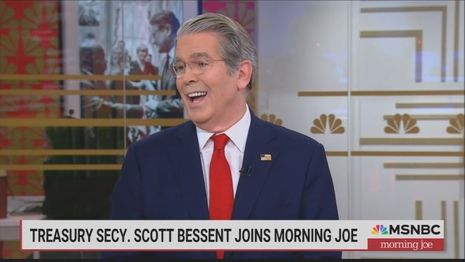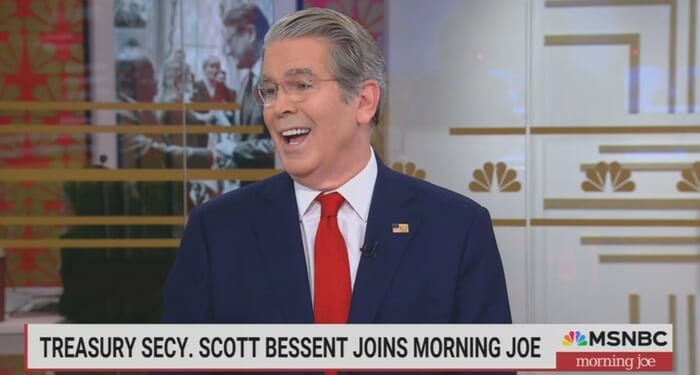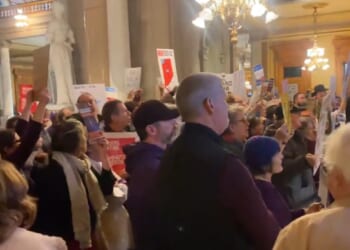 When it comes to dealing with the hostile liberal media, the right is on a roll. Registered Republican Sydney Sweeney showed supreme self-confidence in refusing to fall into the rhetorical traps that her GQ interlocutor laid for her. And with little more than a raised eyebrow and the ability to answer a loaded question with a simple “no,” Sweeney came away from the encounter as the unquestionable winner.
When it comes to dealing with the hostile liberal media, the right is on a roll. Registered Republican Sydney Sweeney showed supreme self-confidence in refusing to fall into the rhetorical traps that her GQ interlocutor laid for her. And with little more than a raised eyebrow and the ability to answer a loaded question with a simple “no,” Sweeney came away from the encounter as the unquestionable winner.
Today, it was Scott Bessent’s turn. In his Morning Joe appearance, the Treasury Secretary delivered a master class in rebuffing, and ultimately vanquishing, members of the liberal media seeking to tarnish the Trump record on the economy…much as he did to George Stephanopoulos on Sunday.
This time, Bessent fended off four members of the Morning Joe crew nipping at his heels. Joe Scarborough, Willie Geist, Jonathan Lemire, and Mike Barnicle took their best shots–and came up empty every time.
When Bessent stated the incontrovertible fact that the media “carries the water” of the Democrats on the economy [among other issues!], Willie Geist snidely replied, “You can blame the media. I understand that’s part of your job.”
But Bessent proceeded to give a perfect example of the phenomenon:
“Unbelievably, Bloomberg had an article yesterday that said, oh, mortgage rates aren’t down that much. Well, on Inauguration Day, the 30-year mortgage was 7.8%. Yesterday, it was 6.22%.That is a gigantic drop. But it said, oh, they’re just down slightly.”
Scarborough asked “how much of a challenge will affordability remain for people that want to heat their homes, want to buy a home, want to be able to pay their rent, want to be able to buy a new car?” Bessent replied:
“A lot of the home heating costs are actually driven by states. I found it very interesting the other day when the governor-elect of New Jersey said the first thing she’s going to do is bring down energy costs. Well, Phil Murphy did a terrible job, and energy costs are high because of the choices he made over the past few years.”
When Lemire challenged Bessent to explain how a “$20 billion bailout helps Americans,” Bessent exposed Lemire’s ignorance of the related terms. He asked why Lemire would call it a “bailout” and asked if he knew what a “swap line” is, leaving a defeated Lemire to sputter that, well, “You’re the Treasury Secretary,” i.e., don’t blame me for not knowing what I’m talking about.
The segment ended with Bessent delivering a devastating coup de grace to the hapless plagiarist Mike Barnicle. Attempting to play the class-envy card, Barnicle said he assumed Bessent had done “very well” in the stock market yesterday, since the market jumped on the news that the government shutdown could be ending. That led to this hilariously humiliating exchange for overmatched Mike:
BESSENT: That would be an incorrect assumption, because I had to sell all my stocks to become Treasury Secretary.
BARNICLE: You sold them all? Really?
BESSENT: Had to, yes.
BARNICLE: But you have a blind trust, I would imagine.
BESSENT: There’s no such thing as a blind trust.
BARNICLE: Okay, thanks. Thanks for straightening me out on that. But anyway . . .
Barnicle had begun the exchange by expressing the hope that his question wouldn’t “piss off” Bessent. Reposted Bessent: “I don’t know, it’s four on one, which seems about right.”
Barnicle was the one ultimately left with the damp Pampers.
Here’s the transcript.
MSNBC
Morning Joe
11/11/25
7:44 am ETWILLIE GEIST: So you don’t believe that all the people who went to vote last Tuesday on the issue of affordability, my rent’s too high, I can’t afford to buy a house, groceries are too expensive, you think they’re just misperceiving what’s happening in their lives?
SCOTT BESSENT: I think that we inherited an affordability crisis, we have slowed the price increases down, and they are going to continue to slow down, and that real working class wages will go up. And that that will address the affordability issue.
And, you know, I think this is what Democrats are afraid to do. They’ve gone to the courts to try to stop President Trump and this great economy. That hasn’t worked. They get overruled at SCOTUS. They go to the media who carries their water. That hasn’t worked. So they shut down the government and hurt the economy. Let’s keep the economy open, let our kick in, and let’s see if what I just talked about, let’s see if those two lines cross. Costs come down, real wages go up, and we can have an election next November.
GEIST: You can blame the media. I understand that’s part of your job.
. . .
BESSENT: Unbelievably, Bloomberg had an article yesterday that said, oh, mortgage rates aren’t down that much.
Well, on Inauguration Day, the 30-year mortgage was 7.8%. Yesterday, it was 6.22%. That is the single biggest component of buying a new home. And that is a gigantic drop. But it said, oh, they’re just down slightly.
. . .
JOE SCARBOROUGH: How much of an issue, the president was asked last night about affordability, and he suggested we didn’t have an affordability crisis. I’m certainly not asking you to cross the president here, but I am curious, over the next six months to a year, how much of a challenge will affordability remain for people that want to heat their homes, want to buy a home, want to be able to pay their rent, want to be able to buy a new car?
BESSENT: Well, Joe, there’s a lot there to unpack. A lot of the home heating costs are actually driven by states. I found it very interesting the other day when the governor-elect of New Jersey said the first thing she’s going to do is bring down energy costs. Well, Phil Murphy did a terrible job, and energy costs are high because of the choices he made over the past few years.
Same for New York State. New York State refuses to put in these natural gas pipelines. There’s an abundance of energy next door in Pennsylvania. You could bring down New York State energy costs just by putting in these pipelines. So part of it’s a choice.
But when you ask over the next six or 12 months, there are two parts to affordability. There’s the price level, and we inherited a mess. It was the worst inflation 40 or 50 years, and I think what the president was very frustrated about is, you know, you said everyone started talking about it, that after he took, like, where was the discussion during Joe Biden?
Because during the Biden era, it was complete gaslighting. There was a vibe session. Steve Rattner, who you just had on, wrote a column basically saying, like, Americans don’t know how good they had it. This is, you just don’t understand. But the American people know what they’re feeling.
. . .
As I said before, there are, with the affordability, there are two components. There’s price, and then there’s real wage gains. And Americans are gonna look back and think that under President Trump’s first term, they saw very substantial wage gains, especially for working Americans and the average household.
So I think they’re going to look back to that. And again, Steve Rattner’s charts very conveniently got truncated in 2020 on that.
. . .
JONATHAN LEMIRE: How does a $20 billion bailout of Argentina help Americans? You’re the president’s point person on that. Can you explain to those here who feeling the pinch, including America’s farmers, why the United States is helping out Argentina?
BESSENT: Well, do you know what a swap line is?
LEMIRE: It’s currency swap, yes.
BESSENT: Yes, but what is that?
LEMIRE: You’re the Treasury Secretary.
BESSENT: Yes, but why would you call it a bailout?
LEMIRE: That is how —
BESSENT: In most bailouts, you don’t make money. The U.S. government made money. We used our financial balance sheet to stabilize the government, one of our great allies in Latin America, during an election. The president there won in a landslide. The government’s going to make money.
. . .
SCARBOROGH: Mr. Secretary, I’m just curious, just to clarify, have we made our money back already from the Argentina bailout or the swap line or whatever you call it? Have we made that money back now? Are you saying we’re going to make that money back from them over time? What’s the payout for that?
BESSENT: Joe, we already have a profit on that swap line.
SCARBOROUGH: So, have we given them, did we transfer $20 billion and we’ve already gotten back?
BESSENT: No. Absolutely not. We made a line of credit available, and a small amount of it was drawn on and we have made a profit on that.
SCARBOROUGH: On that so far. Okay, very good.
Mike Barnicle, next question.
MIKE BARNICLE: Yeah, Mr. Secretary, I hope this question doesn’t piss you off.
BESSENT: I don’t know, it’s four on one, which seems about right.
BARNICLE: Well, okay. Yesterday, the stock market took a pretty good jump on news that the shutdown might come to an end. A lot of people did very well on the stock market, I assume, and I assume that you probably were one of them, and good for you.
BESSENT: That would be an incorrect assumption, because I had to sell all my stocks to become Treasury Secretary.
BARNICLE: You sold them all? Really?
BESSENT: Had to, yes.
BARNICLE: But you have a blind trust, I would imagine.
BESSENT: There’s no such thing as a blind trust.
BARNICLE: Okay, thanks. Thanks for straightening me out on that. But anyway . . .

















